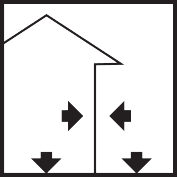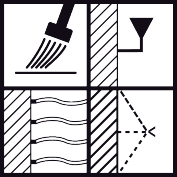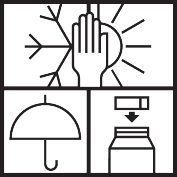Article No. 181010
Single-component, solvent-free, strengthening silicification concentrate

Product specifications
On delivery
The stated values represent typical product characteristics and are not to be construed as binding product specifications.
Field of application
- Porous, mineral building materials such as fired and sand-lime brick, sandstone, mineral renders
- Subsequent horizontal waterproofing of masonry under gravity up to a degree of moisture penetration of 80%
- Subsequent horizontal waterproofing of masonry under low pressure up to a degree of moisture penetration of 95%
- Priming for protection against rear moisture penetration
- Surface improvement
Properties
- Strengthens
- Narrows pores
- Repels water
- Inhibits masonry salt
- Improves adhesion, abrasion resistance and surface strength
- Increases resistance to chemical attack
-
Preparation
-
Substrate requirements
Subsequent horizontal waterproofing of masonry
Drilling channel must be free of drill dust.
Priming for protection against the effect of water from behind
The substrate must be clean and free of oil, grease and release agents.
Surface improvement
The substrate must be clean and free of oil, grease and release agents.
-
Preparations
Subsequent horizontal waterproofing of masonry
Dam the injection area at least 30 cm above and below the row of boreholes (Kiesol MR 1:1 and rigid waterproofing slurry).
Production of boreholes:
Diameter 12 - 30 mm, spacing 10 - 12.5 cm, angle of inclination approx. 45°, borehole depth up to approx. 5 cm from end of wall.For walls > 0.6 m thick, it is recommended to make the series of drill holes on both sides.
Pre-inject BSP 3 or BSP 6 (borehole suspension) into hollow masonry.
Re-pierce filled boreholes after incipient hardening of the BSP.
Wait 7 days before carrying out further work.
-
-
Application
-
Subsequent horizontal waterproofing of masonry
- Under gravity (moisture penetration < 80%):
Using a suitable vessel, e.g. Kiesol Metering Cartridge (417301), fill (multiple times if necessary) until saturated.
- Low pressure (moisture penetration < 95%):
Inject using suitable injection equipment and injection packers.
Priming for protection against the effect of water from behind
Apply material in sections until saturated.
If necessary: pre-wet highly absorbent substrates with water.
Surface improvement
Apply material in sections.
Repeat the procedure (wet-on-wet) until no more material uptake is observed.
-
Application instructions
-
Take appropriate measures to protect adjacent building elements and materials that should not come into contact with the product.
Subsequent horizontal waterproofing of masonry
After injection, fill the boreholes with borehole suspension.
Not suitable for injections in porous concrete, gypsum and clay building materials.
Priming for protection against the effect of water from behind
Immediately remove excess product.
Do not allow the primer to dry out.
Perform subsequent operations wet-on-wet, within the reaction time.
Surface improvement
Protect freshly treated surfaces from driving rain, wind, sunlight and condensation.
Not suitable for improving surfaces where higher requirements are placed on appearance.
We recommend setting up trial areas.
-
-
Working tools / cleaning
-
Brush, surface sprayer, airless spraying equipment, pouring vessel, low-pressure injection apparatus
Additional equipment according to tool programme -
Clean tools immediately after use with water.
Ensure that any residue from cleaning is disposed of correctly.
-
Storage / shelf life
-
At least 36 months in unopened, original containers stored cool, dry and protected from frost.
-
Usage
-
Subsequent horizontal waterproofing:
Approx. 1.5 kg/m per 10 cm wall thickness (can vary significantly depending on porosity of masonry)
Priming:
Approx. 0.1 - 0.3 kg/m² (dilute 1:1 with water)
Surface improvement:
Approx. 0.2 - 0.4 kg/m²
-
General information
-
The relevant test certificates must be observed when planning and carrying out work.
The applicable regulations and legal requirements must be observed.
Information on planning injection processes with and processing certified injection materials against capillary moisture transport can be found in WTA Code of Practice 4-10 and must be taken into account.
-
-
Disposal instructions
-
Larger quantities of leftover product should be disposed of in the original containers in accordance with the applicable regulations. Completely empty, clean containers should be recycled. Do not dispose of together with household waste. Do not allow to enter the sewage system. Do not empty into drains.
-
-
Safety / regulations
-
For further information on the safety aspects of transporting, storing and handling the product and on disposal and environmental matters, please see the current Safety Data Sheet.
-











![BIT 1K [basic] BIT 1K [basic]](https://m.remmers.com/gebindeabbildungen/2400w/38634.png?w=100)





![WP DKS [basic] WP DKS [basic]](https://m.remmers.com/gebindeabbildungen/2400w/81238.png?w=100)
![WP Top [basic] WP Top [basic]](https://m.remmers.com/gebindeabbildungen/2400w/78767.png?w=100&version=1)








